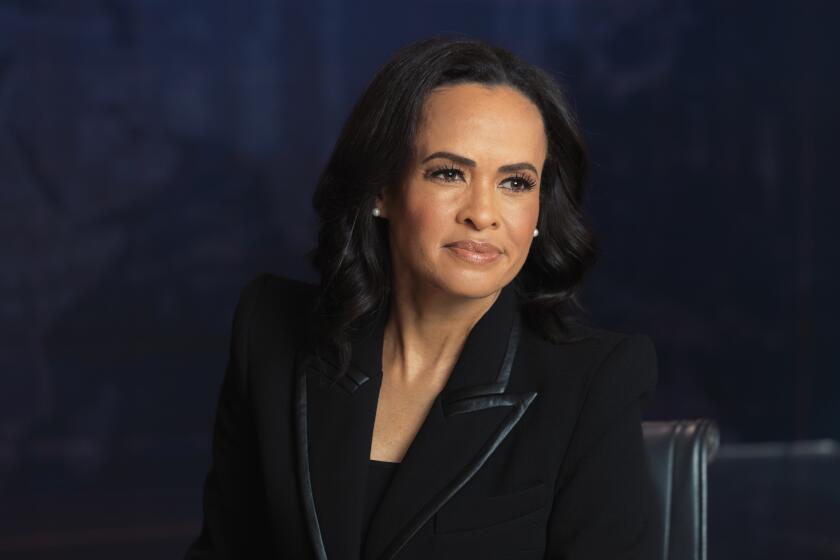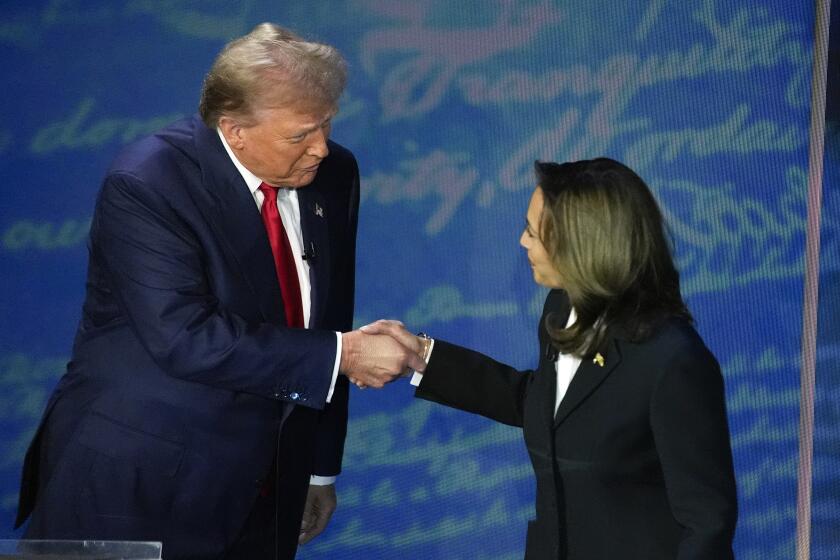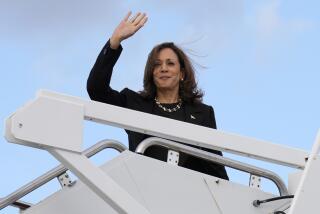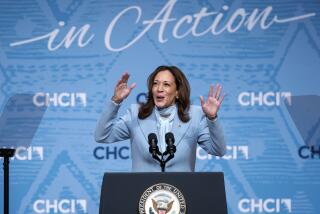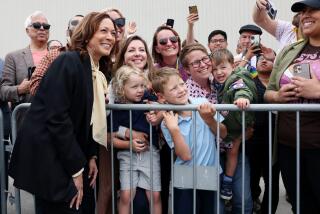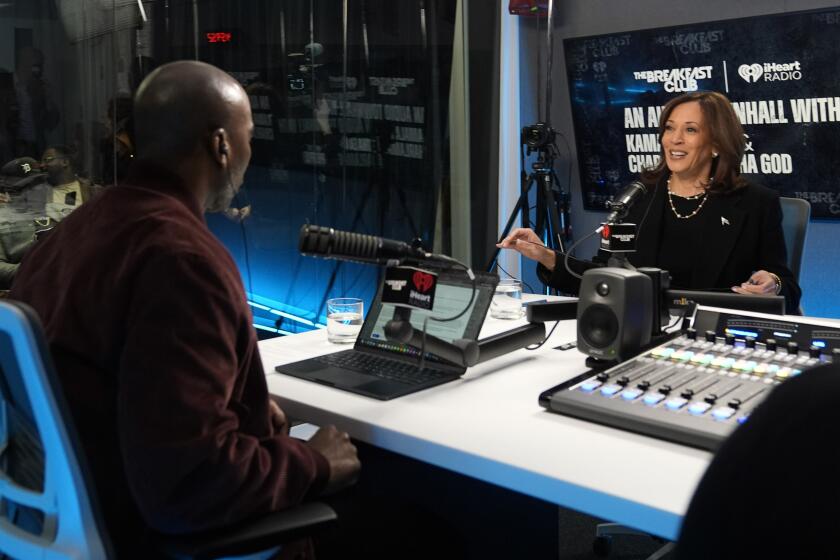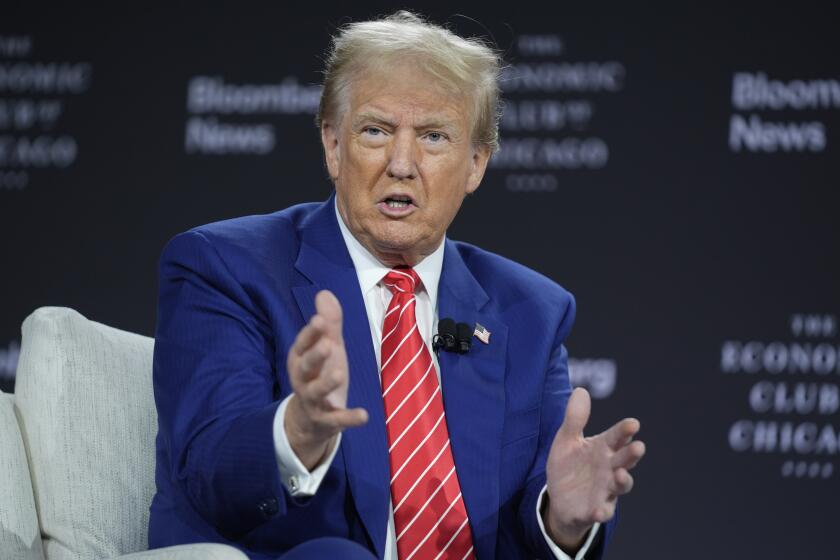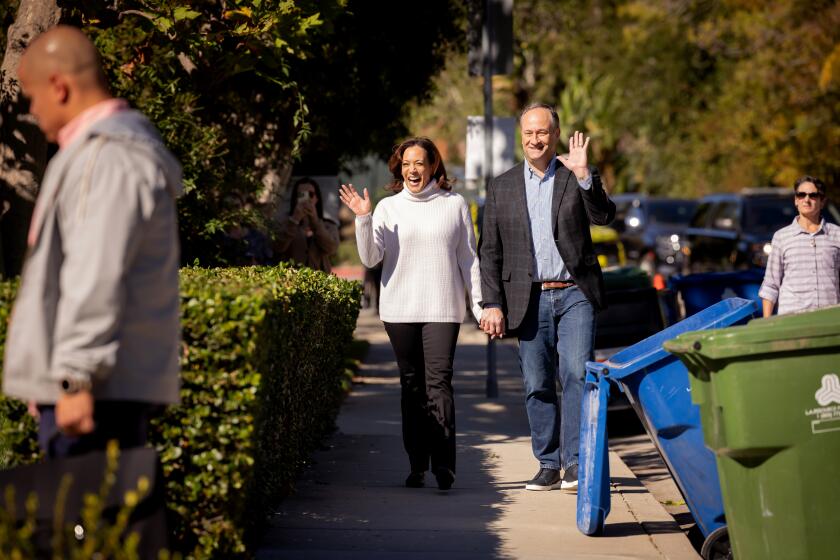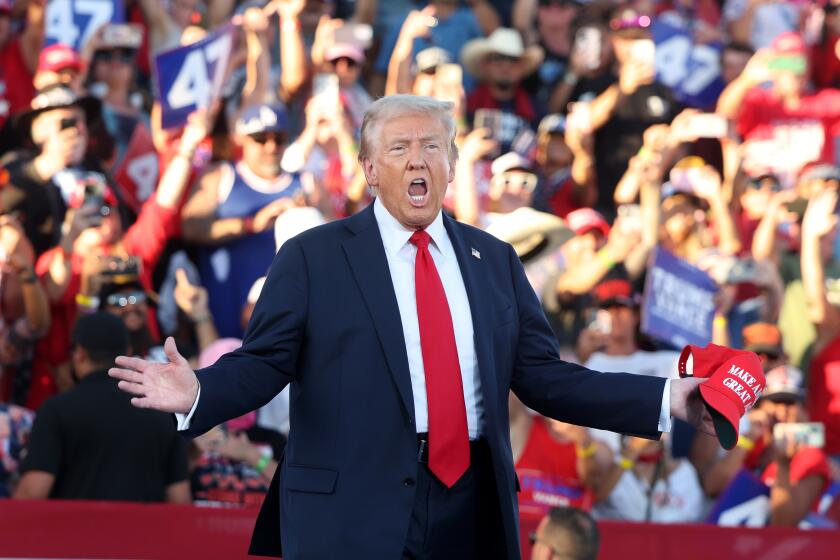In closely divided Nevada, Harris and Trump battle for economic hearts

- Nevada is one of seven states thought to hold the key to victory in 2024.
- About a third of Nevada voters don’t identify with either major party.
Vice President Kamala Harris has never met Maria Rodriguez. She probably never will. But the Democratic presidential nominee should be worried about Rodriguez, and voters like her.
The single mother of three from Henderson, Nev., is a onetime Democratic voter who frets about the economy (meaning: the price of just about everything) and says she plans to vote for former President Trump.
Rodriguez cast her ballot for Joe Biden four years ago, hoping for better times. But, regardless of what government statisticians might say about the economy, the 36-year-old finds it’s harder to pay the bills today, even though she is working two or three jobs as a nurse and home healthcare worker.
“Going to the market is really hard right now,” Rodriguez said as she pushed a mostly empty cart up an aisle of a Dollar Tree discount store last week. “Sometimes, before, you would go in with 100 bucks and come out with a full cart. It was pretty OK. Now, with 100 bucks, you can get maybe 10 things. It’s living paycheck to paycheck.”
“I was potentially a Democrat,” she said. “But I have changed my way of thinking [because] this country is going downhill.”
Views like Rodriguez’s go a long way in explaining why Nevada, which Democrats have won in the last four presidential races, remains up for grabs in the 2024 election. Harris holds a narrow 0.6% advantage in recent polls, according to an aggregate by Real Clear Politics. That’s a marked improvement for the Democrats, given that Trump led in the high single digits in polls before President Biden left the race in July.
The Silver State is one of seven states thought to hold the key to victory in 2024. And it usually picks the candidate the rest of America favors. In the 28 presidential elections since 1912, the winner of Nevada has won the presidency all but two times. The exceptions occurred in 1976, when Nevada chose Republican Gerald Ford over Democrat Jimmy Carter, and in 2016, when Nevada and its six electoral votes went to Hillary Clinton over Trump.
Linsey Davis, the co-moderator of Tuesday’s presidential debate in Philadelphia, has quietly becoming a rising star at ABC News.
Trump will count heavily on Nevadans’ discomfort with the economy to help him grind out a victory in a state that most experts expect to be closely contested through the Nov. 5 election.
The former president has a rally scheduled Friday night in Las Vegas. He has an ad on Las Vegas television stations that features another former Republican president, Ronald Reagan.
“I think when you make that decision, it might be well if you would ask yourself, are you better off than you were four years ago,” Reagan says in video of his closing 1980 debate against President Carter. “Is it easier for you to go and buy things in the stores than it was four years ago?”
That question might serve Trump well this year, as national and state polls continue to show that the economy remains the top issue for voters. The party in power usually pays the price for such sentiments. In an Emerson College poll in August, 37% of likely Nevada voters surveyed named the economy as the top issue, with the related topic of housing affordability second, named by 15% of those surveyed.
Nevada’s elasticity in presidential politics is partly due to the large share of voters — 34% — who don’t identify with either major party.
“That large bloc of independent voters makes the state unpredictable,” said Thom Reilly, a former public official in Nevada’s Clark County and now an academic. “They were supporting Trump by 10% in January, and now the polling is all over the map, and they might be in Harris’ camp. I think those voters make it more volatile.”
Frustrating to Democratic stalwarts is the fact that not all voters have been moved by improving economic indicators, with the buying power of “real wages” growing nationally over the last year.
The state’s unemployment rate of 5.5% in August put it higher than the national average of 3.7%, but the Las Vegas metropolitan region’s 4% jobless rate nearly matched the U.S. as a whole. Those figures pale in comparison to the 31% unemployment that devastated the state during the 2020 onset of the COVID-19 pandemic.
Annual inflation peaked in 2022 at about 9%, and had declined to 2.6% for the American West (including Nevada) by this summer, the U.S. Bureau of Labor Statistics reported. Prices even dropped in some categories, including dairy, fruits and vegetables.
And although gasoline in Nevada is costing an average of $3.98 per gallon this month, above the national average of $3.27, that represents a substantial drop from the $4.62 one year ago, according to AAA.
The boom-bust cycles that Nevadans know too well — with particularly deep holes during the Great Recession and early in the pandemic — have been particularly painful in the housing market.
Apartment rents jumped dramatically in 2022, with the typical rental rate of $1,805 in the Vegas metro area marking a nearly one-third increase from just two years prior. Only three other metropolitan areas experienced bigger leaps. The median rent today stands at $2,070, so increases have slowed but still leave some people struggling to pay their rent.
::
An intake worker at a senior center in the working-class northwest section of Las Vegas said that her clients have been forced to rely on family members, while others have been evicted and forced to move into their cars. Or onto the streets.
“The rent has gone up since Biden’s been in office. It went up when Trump was in office,” said the worker, who asked to go only by her first name, Karen. “We don’t know where the blame lies.”
She said she hadn’t known much about Harris but liked what she saw at the Democratic National Convention.
“She has a lot of new ideas, things that would help,” including proposals for an expanded child-care tax credit, Karen said.
In interviews with 17 people in Henderson and Las Vegas last week, six said they intended to vote for Harris and five for Trump, while six others weren’t sure they would vote at all. Half of those who haven’t committed said they tended to favor the former president; the other half the current vice president.
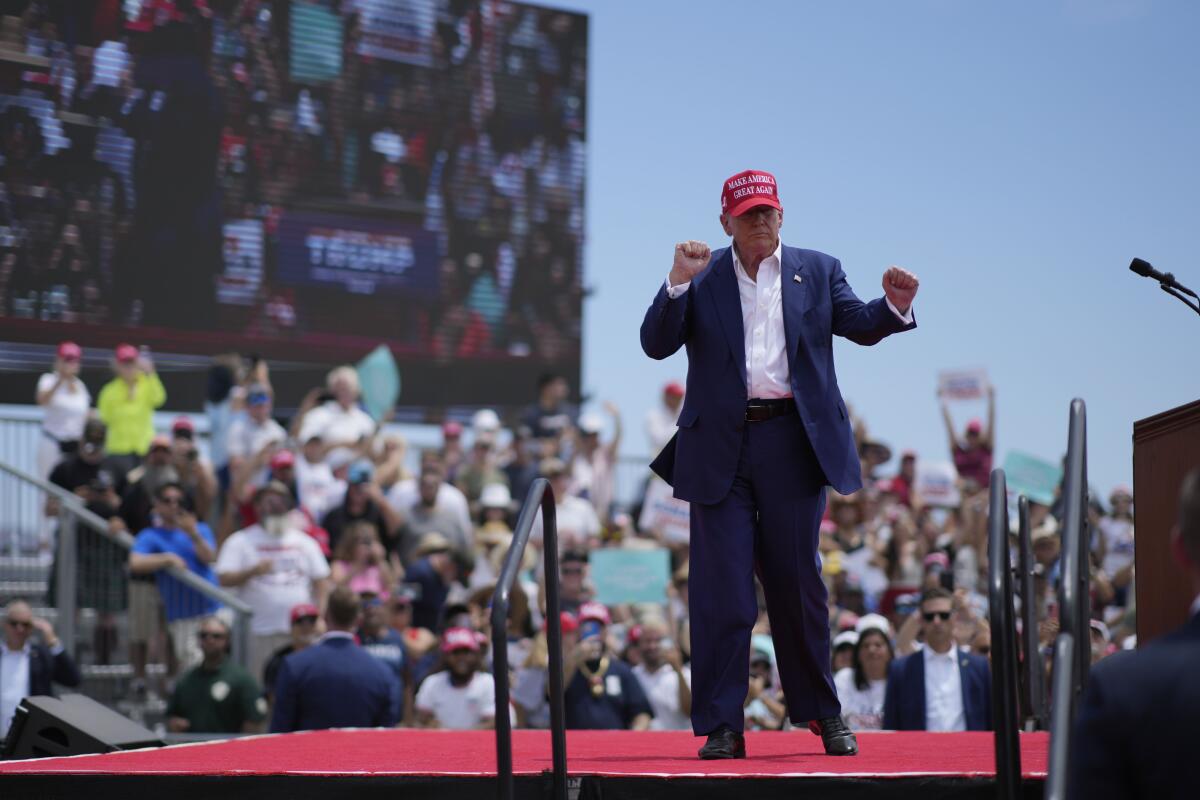
Trump backers tended to stress his background as a businessman and to focus on the bottom line. Prices for most things were lower when the Republican was in the White House, so it’s time to bring him back, they said.
Some also seconded Trump’s frequent complaint that immigrants crossing the border illegally from Mexico are harming the U.S. (Border crossings have decreased in recent months.)
Most Harris supporters said they trusted her to make the kind of changes she promised; such as imposing sanctions on retailers and others determined to be engaged in price gouging. Those who like the Democrat said they were sick of the demonizing of immigrants.
Rodriguez, a mother of three, said her parents came from Mexico legally. She complained about those who come without authorization and then get government benefits.
“You have people coming into this country, and basically everything is handed to them,” said Rodriguez, who grew up in Orange County. “To me, I don’t think that’s fair.”
One aisle over at the Henderson Dollar Tree, Monica Silva expressed a different view. She said Trump “is always talking about the Mexican issue.”
The first meeting between the two 2024 presidential candidates brought in significantly more viewers than Trump’s June 27 face-off with President Biden.
She added: “He is always criticizing them and blaming them. And that is not true. That is not the problem in our country.”
Silva, 77, who immigrated more than half a century ago from Chile, sees Harris as someone who will rein in price gouging.
“I think she’s just powerful, and she has the experience as the lawyer, you know?” Silva said. “I think she can get things done, more than most people can.”
Shara Rule, who works for an electric scooter business, doesn’t feel Harris or the Biden White House are to blame for higher prices. And she sees prices coming down.
“Trump is just greedy. He is helping himself,” said Rule, 61. “She’s smart and got a good head on her shoulders. I think she’s going to lead us in the right direction, economically.”
Susan Kendall, a director of medical records for a nursing facility, felt that Trump got more done, while the Democrats mostly talked.
She fondly recalled the “economic impact payment” of $1,200 in COVID-19 relief she got when Trump was still in office.
“That made a big difference for people, and Biden didn’t even try any of that,” said Kendall, 56. (Actually, Biden signed the American Rescue Plan shortly after taking office, sending payments of $1,400 per person to middle-class families.)
“I don’t know exactly what Trump did. But whatever he did, it worked,” Kendall said. “I feel like Trump focuses inside the country and helping people here inside the country and not helping people from the outside.”
The ad featuring Reagan really hit home with her. “I saw it and thought about how things were four years ago,” she said. “I think that will make it easy to make your decision.”
Mandy, a 35-year-old stay-at-home mom, said prices have gotten so high that she no longer grabs all of the snacks and extras she would like in the supermarket.
“I can’t afford that right now,” she said.
“I just think that the country needs to be run like a business,” said Mandy, a two-time Trump voter who declined to give her last name. “Not so much like Biden is running it now. He’s not like a businessman. He’s a politician.”
Shopping for yarn to crochet hats for friends and family, Kathleen Clark said she sees both political camps as misguided in thinking any president can change economic conditions in the short term.
The 66-year-old Clark, a day trader on the stock market, said long-term micro- and macro-economic forces control the economy. She also doesn’t believe campaign promises, like Trump and Harris promising to eliminate taxes on tips. (“They can’t do it,” she said, “until they figure out how to replace that money.”)
Clark also questioned those who say how much they are suffering. She knows from her retail days, she said, that the kids who started back to school in recent weeks were wearing some pretty pricey outfits.
“Those kids are going out there with $600 tennis shoes and backpacks. They got $1,000 on their backs,” she said with a chuckle. “They’re not hurting.”
One of those ubiquitous Nevada independents, Clark said her vote will be guided by one factor that is beyond argument.
“I’m voting for Harris. Why? Strictly because she’s a woman,” she said. “I don’t believe in Biden. I don’t believe in Trump. I don’t believe in any of the rest of it. But it’s about time [for a female president]. There is nothing else.”
More to Read
Get the L.A. Times Politics newsletter
Deeply reported insights into legislation, politics and policy from Sacramento, Washington and beyond. In your inbox three times per week.
You may occasionally receive promotional content from the Los Angeles Times.
